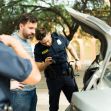Defendant/Appellant Christopher Esqueda was a felon who tried to sell methamphetamines (meth) and a loaded .22 caliber revolver from his Anaheim hotel room in January 2020. Unfortunately for him, the potential buyers were two undercover law enforcement agents, one from the Bureau of Alcohol, Tobacco, Firearms and Explosives (ATF) and the other from the Costa Mesa Police Department (CMPD). The agents did not have a search warrant, but Esqueda gave his consent for them to enter his hotel room. The agents surreptitiously recorded the room and the sale with concealed audio-video equipment.
Esqueda entered a conditional guilty plea to charges that he possessed a firearm as a felon. The condition was that he could preserve his motion to suppress the agents’ evidence for use at a later date. He was sentenced to 24 months in prison and three years of supervised release. At trial, Esqueda had filed a motion to suppress the agents’ evidence, arguing that the secret recordings “exceeded the scope of the implied license he granted when he permitted the agent to enter.” He claimed the search violated his Fourth Amendment rights that protect against unreasonable searches and seizures.
In his brief, he argued “…It is not a habit of the country” or a widely shared social expectation, that a person might secretly videotape the interior of a person’s living space after being invited to enter…But entering with a hidden camera to capture everything within sight…far exceeds the implied scope of the invitation into one’s home.” The District Court was not persuaded and denied Esqueda’s motion to suppress the video evidence.
The facts revealed that his co-defendant Daniel Alvarado had previously sold meth to ATF and CMPD officers, and it was Alvarado who mentioned that he might also have a firearm for sale. But at the time of the secret recordings, it was Esqueda who handed the firearm to the officers. A later records search confirmed his identity and his previous felony conviction. This appeal followed.
The Ninth Circuit affirmed the District Court’s motion to dismiss on December 12. Writing for a unanimous 3-0 panel, Senior Circuit Judge Carlos T. Bea affirmed the decision of Presiding Judge John F. Walter of the Central District of California. After reciting the facts relevant to the search and the recordings, Bea quickly cited two U.S. Supreme Court precedents that found no Fourth Amendment violations when undercover officers “enter premises with express consent and secretly record only what (they) can see and hear.” (Lopez v. United States (373 U.S. 427, 438–39 (1963); and On Lee v. United States, (343 U.S. 747, 752–53 (1952).
Bea then discussed various tests that the courts have more recently used to determine what constitutes unreasonable searches and seizures. Bea began by explaining the history of rulings related to unreasonable searches and seizures. He said, “The Amendment establishes a simple baseline… When the Government obtains information by physically intruding on persons, houses, papers, or effects, a search within the original meaning of the Fourth Amendment has undoubtedly occurred.”
However, the scope of Fourth Amendment rulings was updated and clarified in Florida v. Jardines 569 U.S. 1 (2013), the case on which Esqueda relied in his appeals. Jardines concerned the legality of bringing a drug-sniffing dog to a home to investigate drug trafficking. The Supreme Court explained that a Fourth Amendment violation was committed because there was no consent to the sniffing dog, so both probable cause and a search warrant were necessary. Justice Antonin Scalia wrote in that “an implicit license typically permits the visitor to approach the home by the front path, knock promptly, wait briefly to be received, and then leave.” However, the use of a trained police dog “in the hopes of discovering incriminating evidence is something else.”
Applying Jardines to Esqueda’s case, Bea wrote that the “…officers merely saw and heard precisely what Esqueda contemplated they would see and hear when he consented to the officers’ entry and voluntarily engaged in an illicit firearms transaction.”
But, more specifically, Esqueda’s challenge rested on the legality of the secret recordings. Bea distinguished Jardines from Esqueda’s circumstances because unlike , Esqueda had expressly consented to the officers’ entry into his hotel room and therefore “did not transform their physical presence into an illegal Fourth Amendment search under .” In addition, Bea noted that the Supreme Court has “twice held that a defendant has no Fourth Amendment right to object to reliable forms of evidence, like recordings.”
Bea concludes his opinion with a cautionary note. He wrote, “Our holding today is a limited one. We express no view as to whether an undercover agent’s use of other, more advanced technologies during a consensual encounter—such as those that might allow the government to detect more than the agent’s natural senses could detect—might constitute a Fourth Amendment search. But where, as here, an officer enters a premises with express consent, and secretly uses recording equipment to capture only what he can see and hear by virtue of that consented entry, no Fourth Amendment search occurs under the trespassory, unlicensed physical intrusion framework as articulated in…Jardines.
“When an undercover officer has express permission to enter an area, the making of a secret recording does not negate the consent,” the Ninth Circuit ruled.






